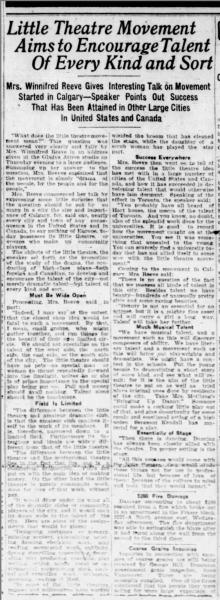“What does the little theatre movement mean”? This question was answered very
clearly and fully by
Mrs. Winnifred Reeve in an address given at the Gladys Attree
studio on Thursday evening to a large audience.
Summoning
up her answer to the question,
Mrs. Reeve explained that the movement is
simply
“drama of the people, by the people and for the people.”
Mrs. Reeve commented her talk by expressing some little surprise that the question
should be put by so many in a city the size and importance of Calgary, for, said she,
nearly every city and town of any consequence in the United States and in Canada, to
say nothing of Europe, today possesses its little theatre, or groups who make up
community players.
The objects of the little theatre, the speaker set forth as the promotion of the
study of drama, the production of high-class plays--both foreign and Canadian, to
develop and encourage the talent of the city--not merely dramatic talent--but talent
of every kind and sort.
Field is Limited
“The difference between the little theatre and amateur dramatic club is that the
amateur club confines itself to the work of its members. It is, therefore, narrowed
down to a limited field. Furthermore its intentions and ideals are widely
different from that of the little theatre.”
“The difference between the little theatre and the professional theatre lies in the
fact that the one is a commercial proposition. Plays are put on with the main idea
of making money. On the other hand the little theatre is purely community work,
done for love of that work, without pay.”
“It would draw under its wing all of the dramatic clubs or community players of the
city, and it would open its doors wide to the talent of the city. Here are some of
the assignments that would be given”:
“Designing costumes or scenery, painting scenery, ,
printing, dancing, electrical work, play reading, secretarial work, publicity,
dyeing, stencilling, typewriting, decorating, play producing, coaching, play
writing, acting, music, vocal or instrumental, carpentering work, clerical and
executive work, orchestra, shopping,
reading of MSS.”
“In some of the little theatres princes and millionaires have worked wielded the broom that has cleaned the stage, while the
daughter of a scrub woman has played the star part.”
Success Everywhere
Mrs. Reeve then went on to tell of the success of the little theatre idea has met
with in a large number of cities of the United States and Canada, and how it has
succeeded in developing talent that would otherwise have lain dormant. Speaking of
the effort in Toronto, the speaker said:
“You probably have all heard of Hart House, the mecca of the talent of Toronto. And
you know, no doubt, also of the splendid work done by the universities. It is good
to record how the movement caught on at the universities. You see it was something
that appealed to the young. You can scarcely find a university today that has not
allied itself in some way with the little theatre movement.”
Coming to the movement in Calgary,
Mrs. Reeve said:
“There is no question of the
fact that we possess all kind of talent in this city. Besides talent we have
beauty--hundreds of unusually pretty girls and some raving beauties.”“Beauty is not an essential for an actress but is a mighty fine asset and will
carry a girl a long way. Talent will take her farther.”
Much Musical Talent
“We have musical talent, and a movement such as this will discover composers of
ability. We have literary talent and a movement such as this will bring out
playwrights and dramatists. We might have a contest in the schools. Put the young
people to dramatizing a short story of some kind and see what will result: for it
is the aim of the little theatre to put on as well as tried plays original ones
done by residents of the city.”
“Take Mrs. McClung’s ‘Bringing Up Danny.’. Someone could make a corking little
play out of that and give opportunity for some comic and emotional acting of a
high order. Sergeant Kendall has material for a play.”
Essentiality of Stage
“Then there is dancing. Dancing has always been closely allied with the theatre.
Its proper setting is the stage.”
“All this you see would come with the little theatre. This would these things not for use in professional life but because
of love of them because of the culture to mind and body that they would
impart.”
